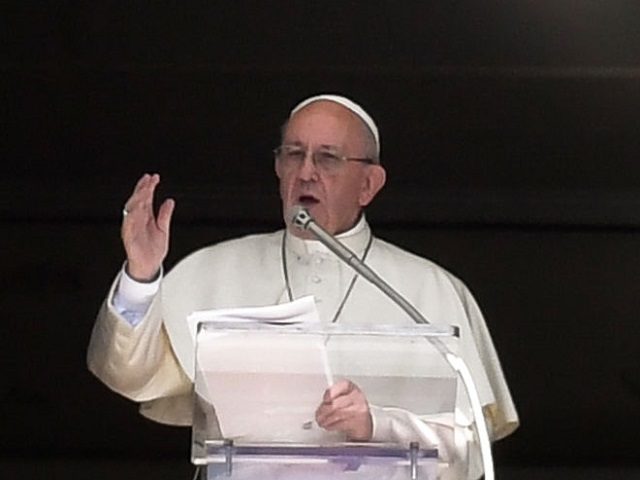On Sunday, Pope Francis denounced the “terrible terrorist massacre” carried out by Islamic militants of the Taliban in the Afghan capital of Kabul Saturday.
After his usual midday prayer of the Angelus in the Vatican Sunday, the Pope turned to the news of Saturday’s slaughter, addressing the thousands of pilgrims gathered in Saint Peter’s Square.
“Yesterday painful news arrived from Afghanistan telling of the terrible terrorist massacre carried out in the capital city of Kabul leaving nearly one hundred dead and numerous injured,” he said.
“A few days ago, another serious attack also on Kabul had sown terror and death in a large hotel,” he continued. “How long must the Afghan people bear this inhuman violence?”
Just after noon on Saturday a Taliban jihadist driving an ambulance packed with explosives set off his car bomb in the Afghan capital of Kabul, killing 95 people and injuring 191 more, according to Afghan officials. Shortly afterward, Taliban spokesman Zabiullah Mojahid claimed responsibility for the attack.
A week ago, Taliban fighters stormed Kabul’s Intercontinental Hotel, in an attack that killed 22 people, including four Americans.
The Pope ended his appeal Sunday by imploring prayers for the victims and their families, as well as for all those who work for peace in that country.
The Taliban is a hardline Sunni Islamic terrorist group that came to prominence in Afghanistan in the autumn of 1994 and is currently active in Afghanistan and Pakistan. The Taliban have promised to bring peace and security to the area by establishing Sharia, or Islamic law in the region.
Pope Francis caused a media stir in early 2017 when he denied the existence of Islamic terrorism.
“Christian terrorism does not exist, Jewish terrorism does not exist, and Muslim terrorism does not exist. They do not exist,” Francis said in a speech to a world meeting of populist movements in the Vatican last February.
Francis downplayed the religious component of modern terrorist movements, suggesting that terrorism is principally the result of economic inequalities rather than radicalized religious beliefs.
“The poor and the poorer peoples are accused of violence yet, without equal opportunities, the different forms of aggression and conflict will find a fertile terrain for growth and will eventually explode,” he said.
Francis also reiterated his belief that all religions promote peace and are equally susceptible to violent radicalization.
“There are fundamentalist and violent individuals in all peoples and religions—and with intolerant generalizations they become stronger because they feed on hate and xenophobia,” he said.
The pope’s earlier statements suggesting economic roots to terror provoked a strong public reaction from the Islamic State terror group, which insisted that their sole motivation is religious and sanctioned by Allah in the Qur’an.
Pope Francis “has struggled against reality” in his efforts to portray Islam as a religion of peace, declared an article in the ISIS propaganda magazine Dabiq, before going on to urge all Muslims to take up the sword of jihad, the “greatest obligation” of a true Muslim.
Some months before, the Pope Francis appeared to suggest that all religions are equally prone to violence and that Islam and Christianity are fundamentally the same in this regard.
“If I speak of Islamic violence, I must speak of Catholic violence,” Francis said. “And no, not all Muslims are violent, not all Catholics are violent. It is like a fruit salad; there’s everything.”
Follow Thomas D. Williams on Twitter Follow @tdwilliamsrome

COMMENTS
Please let us know if you're having issues with commenting.